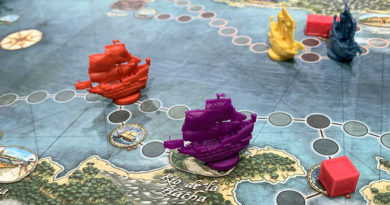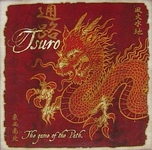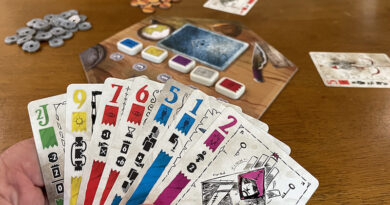Build your kingdom with dice in Kingdomino Duel
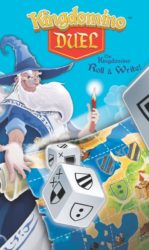
Two years ago we reviewed a terrific family board game called Kingdomino by Blue Orange Games.
Later that year, we reviewed a derivative game called Queendomino that’s also a lot of fun. It was the same game at the core but with a handful of new elements mixed in.
Then last year we reviewed an expansion for both games called Kingdomino: Age of Giants.
So it shouldn’t come as a surprise that when Blue Orange Games published a 2-player iteration of the game that revolves around dice, called Kingdomino Duel, we were chomping at the bit to give it a try!
And it’s time to tell you all about it!
How to play Kingdomino Duel
The core of Kingdomino lies in part of the name, “domino”. In the original, players draft tiles in the shape of dominoes. There are two halves to each tile representing different terrain spaces. Players piece the tiles together in their own kingdoms to score the most points.
We’re happy to report that this core element of placing dominoes in personal kingdoms is alive and well in Kingdomino Duel.
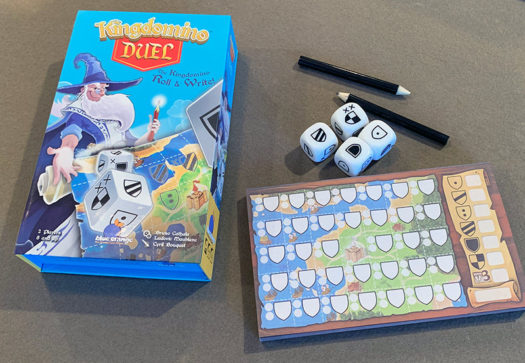
The new twist however is that the 2 players get to build their own “dominoes” from the dice pool rolled at the start of each round. And like the original, the challenge is to score the most points for different domains of their kingdom.
However, instead of domains of different terrain types, Kingdomino Duel dice depict Coat of Arms representing different families in the kingdom.
The only set up to the game is for each player to take a Kingdom sheet and a pencil. Players also use another sheet and place it in the center of the table with the reverse side up to track special spells to be gained. This is called the Spellbook.
Playing
The starting player rolls all 4 dice and selects 1 of them to use as part of his domino. The other player then selects 2 dice to create their domino. And the starting player takes the last die to complete their domino.
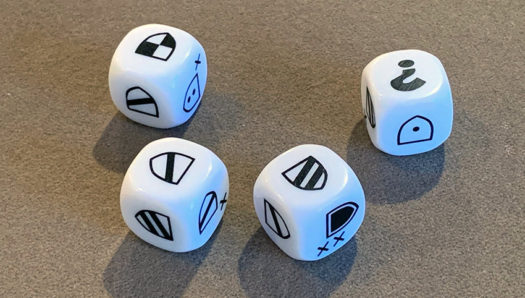
Now that each player has 2 dice, they choose where to place them in their kingdom. To do so, they each mark on their own Kingdom sheet where they would place the domino. On their map, they draw in the coat of arms shown on the dice they’ve selected. If the coat of arms shows an X or 2 Xs on the die, the player likewise places an X or 2 Xs in the little circles next to that coat of arms on their sheet.
Domino placement must follow these 2 rules:
- Connect one of the symbols on the domino to the central Castle space regardless of the coat of arms symbol.
- Connect at least one of the symbols on the domino to a matching coat of arms already in the kingdom. Dominoes must be connected orthogonally (not diagonally).
If players can’t add their domino according to these connection rules, they draw nothing in their kingdom this turn.
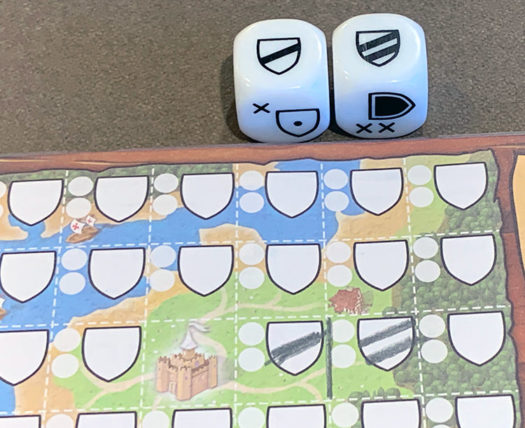
When a player adds a coat of arms to their kingdom without an X on it, they cross off a square in that row of the Spellbook sheet. While a question mark symbol on a die is a wild (the player can make it any coat of arms they wish), they don’t get to fill in a square for that wild coat of arms in the Spellbook.
The first player to fill in all the squares for a particular coat of arms in the Spellbook, gets to use that spell!
And the other player won’t be able to use that spell at all during the game.
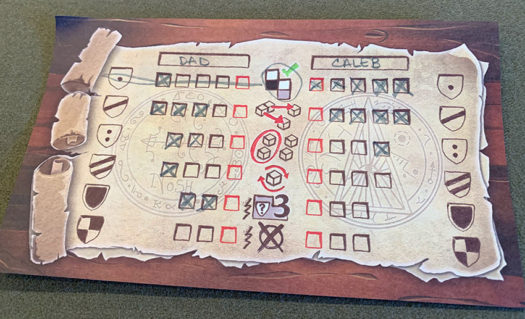
These special powers include:
- Playing a domino without following connection rules.
- Separating dice to fill in individual spaces on the map.
- When acting as the starting player, choosing 2 dice right off the bat instead of just one.
- Turning one of the dice collect to the face of their choice.
- Choosing a coat of arms and scoring 3 points for each different domain of that type at the end of the game.
- Adding one X to the coat of arms of their choice on that turn.
Also, once per game each player may add one X to one of the 2 dice taken on a turn. The die chosen can’t be used to make a space in the Spellbook though. They color in the roof of their central castle when they use this power to show they can’t do so again.
After players have marked their dominoes in their kingdom as well as marking spaces in the Spellbook, another turn begins.
The opposite player now rolls the 4 dice and selects one. Thus each turn players alternate the order in which they claim dice for their dominoes.
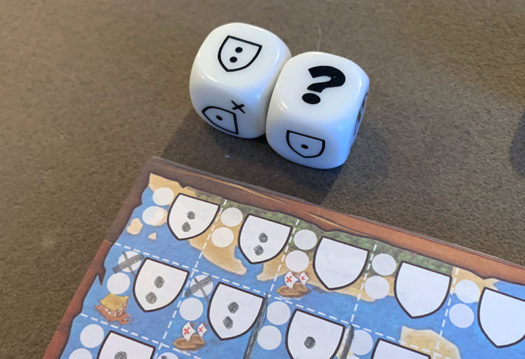
Game end
The game ends when either at least one player has filled in all the spaces in their kingdom or neither player is able to place their domino that turn.
Then players add up their final scores using the scoring area of their kingdom sheet.
Each Domain (continuously connected coat of arms of one type) in the kingdom scores points by multiplying the number of coat of arms in that domain by the number of Xs in that same domain. A domain with no Xs is worth 0 points.
If a player claimed the wizard 3 point bonus spell, they also add in those points.
The player with the most points is the winner!
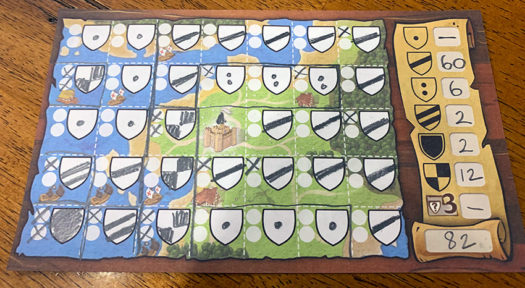
Can the whole family enjoy Kingdomino Duel?
Yes, the whole family can enjoy playing Kingdomino Duel, but just not all at the same time!
Actually, the recommended age for the game is 8+. So for younger players, you’ll have to decide. But everyone else could totally enjoy this light dice-rolling and kingdom-building game.
We love games that allow everyone in our family to be able to play together. That’s why we really enjoy good games that 6 players can play together. However, our family dynamics are such now (with kids out of the nest) that 2-player games are in high demand. So I love finding games that my wife and I can enjoy playing together.
And Kingdomino Duel is such a game!
It’s a light game with a good amount of luck, but still dependent on smart decisions.
It’s also a very quick game to play.
Roll the dice, choose your dice, write them on your sheet, and go again.
Plus, since each player is placing their created domino on every turn, there’s no downtime at all in the game. It’s simultaneous play for 2 players!
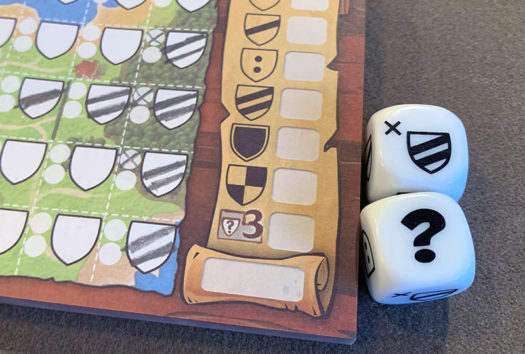
There can be some tricky choices on which dice to take and where to place them. When you get to go first, you only get to choose 1 die before your opponent chooses 2 dice. So there can be a lot riding on dice selection choice itself.
Of course, you’ll want to grab a die that will help you score well in your kingdom, but you’ll also want to keep an eye on which dice your opponent needs.
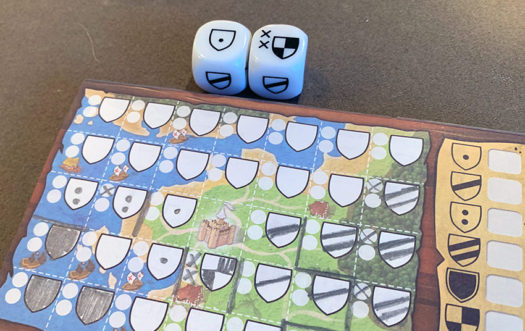
Yes, the dice with Xs are great to grab (because you can’t score points for a domain it doesn’t have any Xs), but the dice without Xs are the ones you’ll get to mark off in the Spellbook. So those can be advantageous as well to get special powers that are sure to help you. (As long as you can fill in those spaces before your opponent.)
Then there are the choices about where to place your domino once you’ve taken your dice. You’ll want to plan ahead, but you’ll also be at the whim of the dice rolls in which coat of arms will appear later. So you’ll want to hedge your bets at the game time.
It makes for a fantastic balance throughout the entire game.
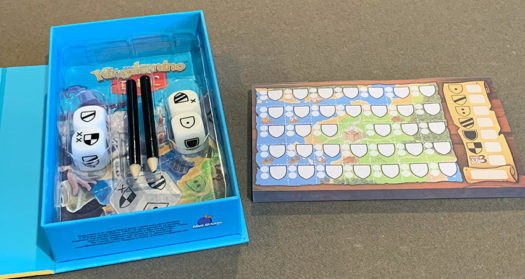
And as we’ve come to expect from Blue Orange Games, the component quality is also superb.
The dice are nice and chunky and give a great tactile experience. And the kingdom sheets are simple to use for building your kingdoms.
We also like that the Spellbook is on the back of each kingdom map. So once you’ve used a map, you can use the backside of that for a subsequent game. Because you can almost guarantee there will be a subsequent game…
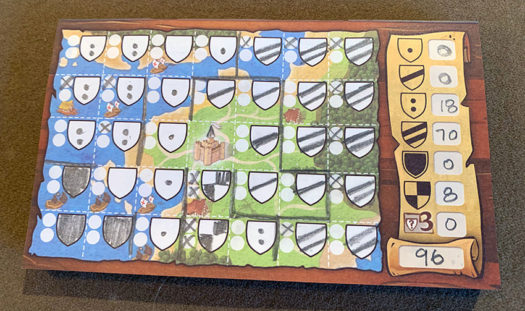
How does Kingdomino Duel score on our “Let’s “Play Again” game meter?
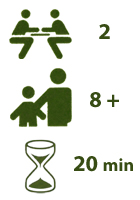 As we just insinuated, Kingdomino Duel scores extremely high on our “let’s play again” game meter.
As we just insinuated, Kingdomino Duel scores extremely high on our “let’s play again” game meter.
Our first game of Kingdomino Duel took about as long as stated on the box — 20 minutes. However, subsequent games have lasted about 15 minutes. Which means that Kingdomino Duel is a quick game to play and tempting to play again and again.
Since it’s a 2-player game, our competitive spirit also kicks in each time we play. So of course the losing player will throw down a challenge to play again. (And the winning player may do so as well…)
If you’re looking for a light and fun dice game for your family, definitely put Kingdomino Duel on that list.
We’d like to thank Blue Orange Games for a review copy of Kingdomino Duel.



